The best gaming routers
The best gaming routers don't just offer speed; they also have no trouble meeting the reliability demands of competitive gamers on their home networks. Most also come with looks so edgy they'd look at home on the crest of a Gundam or scuttling around the deck of the Bebop. With Wi-Fi 6 support growing and promising greater bandwidth to a greater number of devices, now is the perfect time to upgrade your old router with something a little smarter.
Setting up the perfect home network for gaming is crucial for making sure all that money you're paying for superfast broadband is being used for the things that matter. And by things that matter, I mean playing Apex Legends, Valorant and Destiny 2, lag-free. Even the best gaming laptops or gaming PCs need a little help to get the best performance if you're looking for faster downloads or the smoothest experience for online gaming.
While gaming is best on a wired connection, high-speed Wi-Fi is now certainly a thing and getting better. But it can be tough getting wireless internet coverage all around your home, so it could be worth checking out the best Wi-Fi range extenders if you need a boost.
Best gaming router 2021
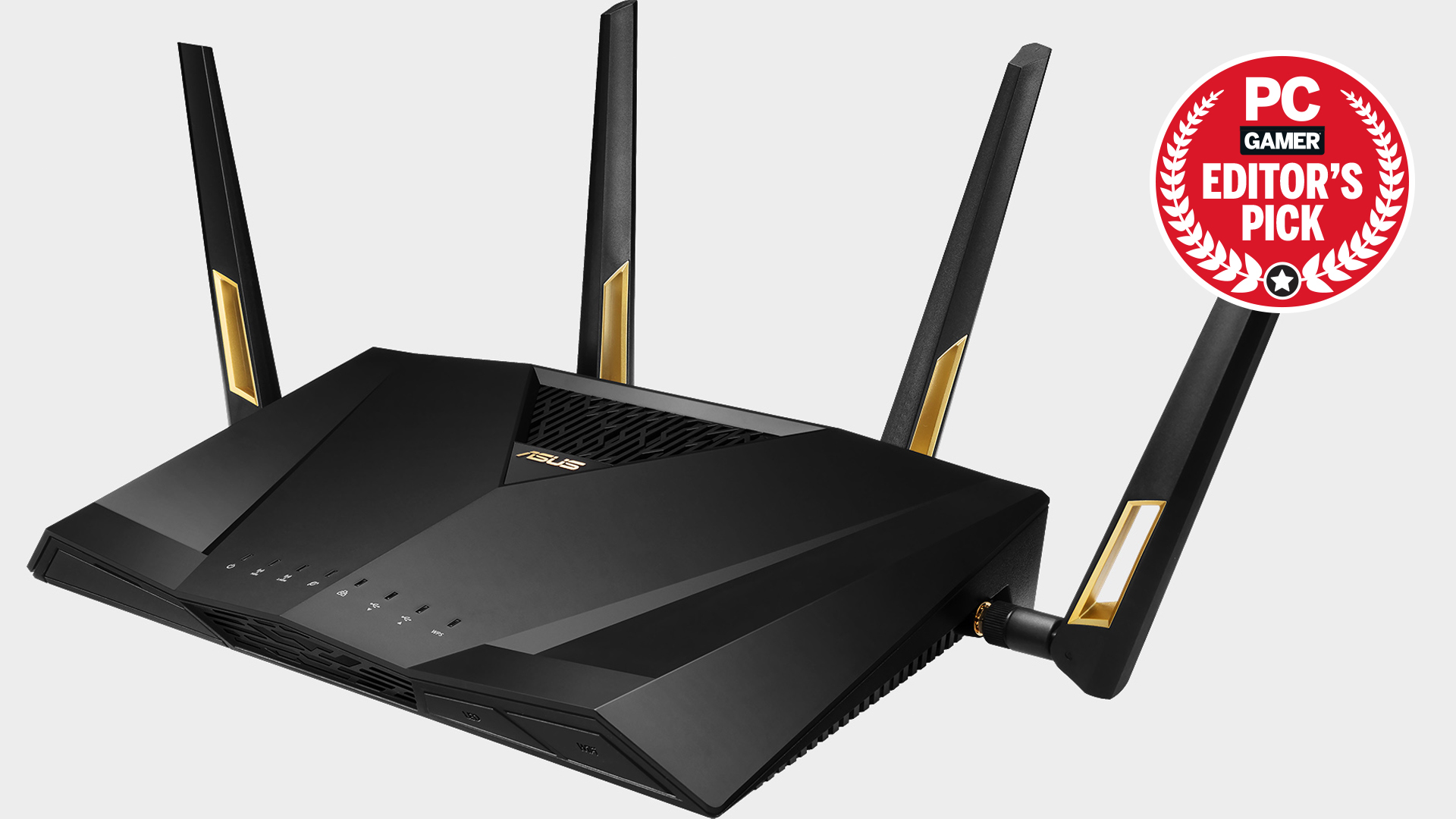
The Asus RT-AX88U is the best choice for a high-end router. It features next generation Wi-Fi 6 (802.11ax) technology, and an impressive eight Gigabit Ethernet ports, which even support link aggregation. Backing this up is the usual excellent AsusWRT interface, which allows granular control of every imaginable setting. There is also class leading Adaptive QoS, along with Trend Micro antivirus and the WTFast GPN—all with subscriptions included for the lifetime of the router—which are standouts among competing routers.
While the 2.4 GHz speeds are adequate, the 5 GHz speeds are where the RT-AX88U shines. Furthermore, for gaming in a congested environment, this router outdistances the competition. Sure, next generation 'super router' performance comes at a price of $346, but given these benchmarks, at least it's justifiable.
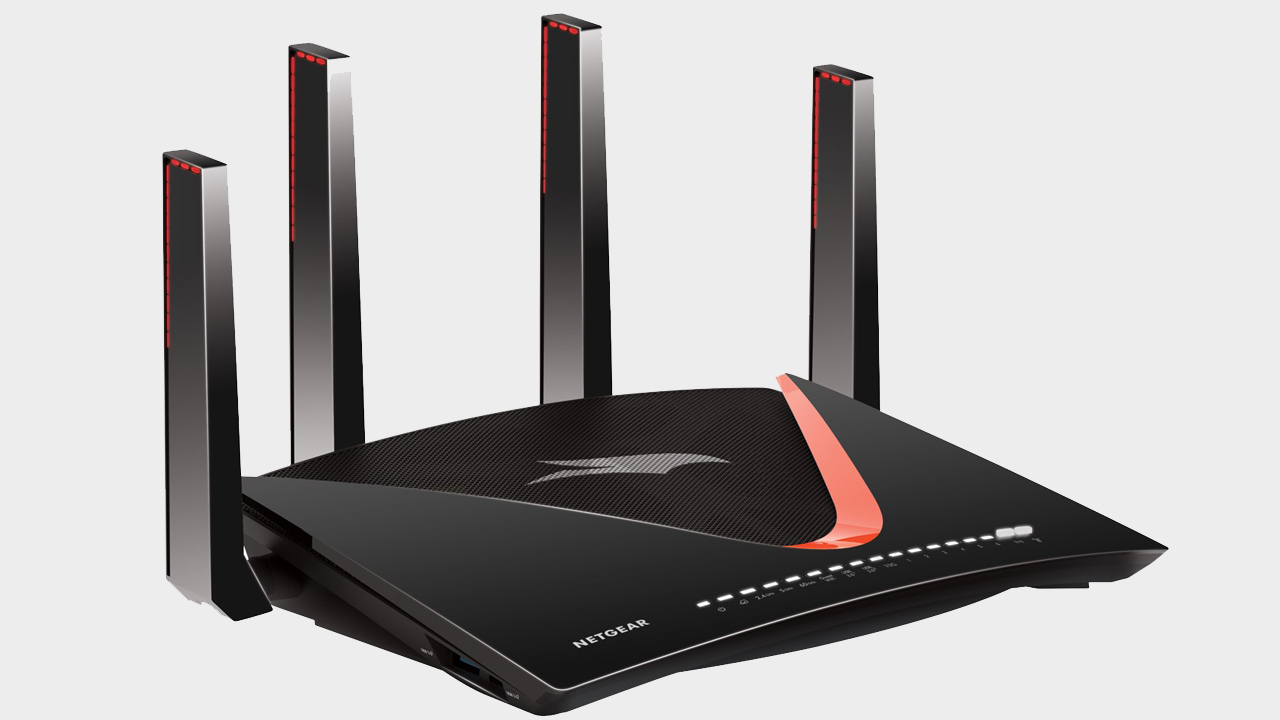
The Netgear Nighthawk Pro Gaming XR700 is a strong follow up to the XR500, which impressed us last year as it was the fastest router we had tested to date. Both are part of the company's 'Nighthawk Pro Gaming' networking line of products—but the XR700 is even faster than its predecessor.
The XR700 has plenty of the right ingredients, with one WAN and six LAN ports for enough wired connections, support for link aggregation, and even a 10 Gigabit LAN SFP+ port for ridiculous Ethernet bandwidth. Let's just get it out of the way—with all the attention on the wireless market heading to 802.11ax/Wi-Fi 6, this XR700 uses a combination of last generation 802.11ac/Wi-Fi 5 wireless, and 802.11ad technology (that's the 60 GHz frequency one), which unfortunately has not gone mainstream. It also supports Beamforming via four active antennas.
Another highlight of the XR700 is the gaming-centric Duma OS, which boasts Geo-Filter tech to connect to the closest server when gaming. The XR700 has granular control of the bandwidth, and can prioritize throughput by each individual device, for both the upload and download separately, and can assign a specific percentage for each device to balance the load—thereby preventing any single device from becoming a bandwidth hog.
In our tests the XR700 is a strong all around performer, starting with the 2.4 GHz frequency with some of the fastest scores to date of 284 Mbps at close range, and 225 Mbps on our far test. This continued on our 5 GHz testing with strong scores of 325 Mbps and 332 Mbps at close and far ranges, respectively.
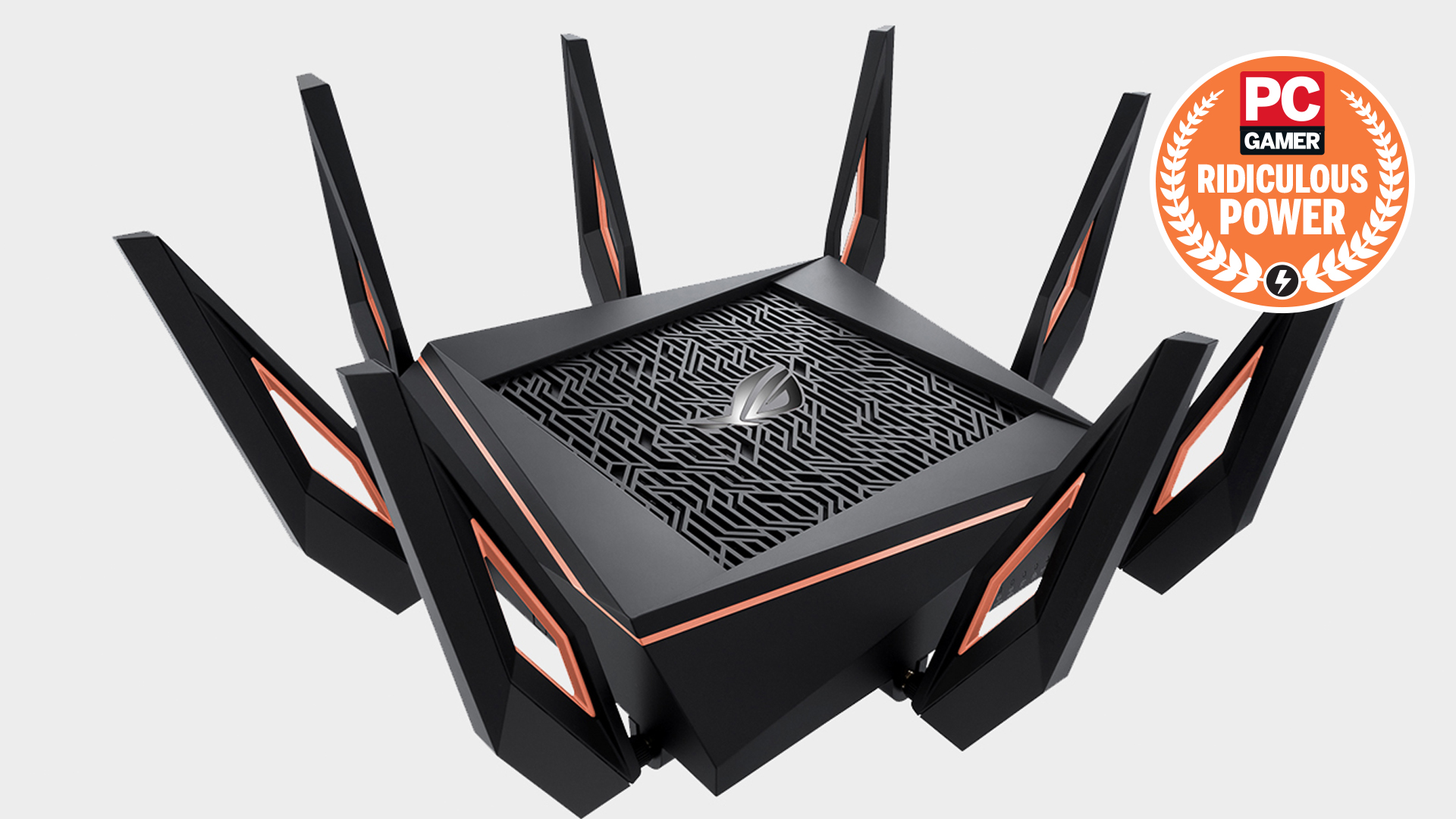
The Asus ROG Rapture GT-AX11000 is designed to be the class-leading, 'best of the best gaming router, and looking at the hardware specs, it delivers—big time. Building on the prior routers of this series, the Asus ROG Rapture GT-AC5300, and adding in Wi-Fi 6 technology, it promises a lot. This router uses a dedicated 2.5G Base-T port for higher wired bandwidth and four Gigabit LAN ports, although we prefer the eight ports that other Asus routers offer.
On the wireless side of things, this is a Wi-Fi 6 tri-band solution offering more than 10 Gigabits of wireless bandwidth, along with DFS bands to avoid interference. Additional gaming-centric features include integrated WTFast, VPN Fusion to segregate gaming traffic from VPN for maximum throughput, Dynamic QoS to prioritize gaming traffic, Games Radar (no, not that one) to check the ping times to different game servers to minimize latency, and for those that prefer a more colorful surrounding, Aura RGB.
Running the Asus ROG Rapture GT-AX11000 through our testing left us seriously impressed. While the 2.4 GHz speeds are decent 171 Mbps on the far test, the 5 GHz speeds are exceptional, with the fastest throughput speed of any router so far at 334 Mbps. Oh, and we don't even have an 802.11ax USB Wi-Fi adapter yet, so this is using 802.11ac gear on the client-side. Yes, this router is really that good.
Best gaming laptop | Best capture card | Best gaming monitor | Best gaming headset | Best computer speakers | Best SSD for gaming
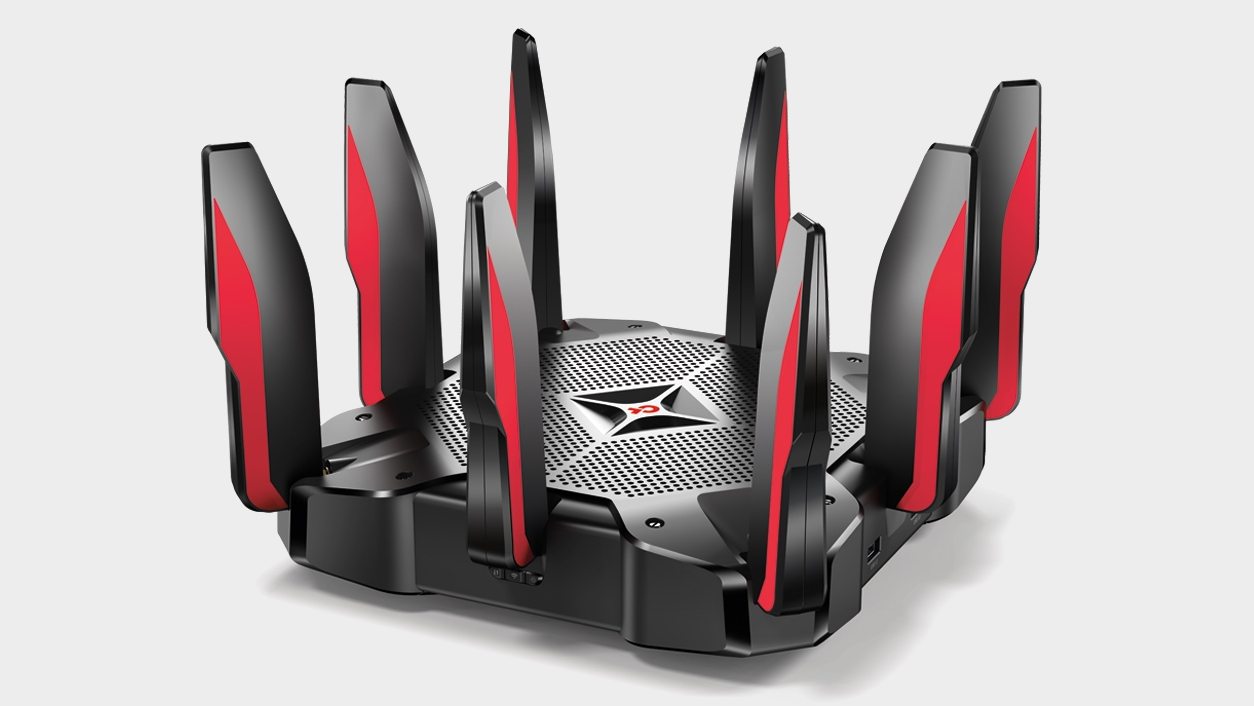
TP-Link's latest high-end gaming router is a significant improvement over previous models and now ranks among the best gaming routers around—especially when it comes to the 5GHz range, at which it excels. Our review of the TP-Link Archer C5400X saw us awarding it near-top marks. We love how easy the C5400X is to set up and use while still offering strong features: the ability to manage QoS easily, the inclusion of network security (via Trend Micro), and options to not only blacklist but also allow certain devices.
In terms of the throughput speeds, our tests clocked the following for the Archer C5400X: at 2.4GHz, it delivers 117 Mbps near / 112 Mbps far, which is somewhat middling, while at 5GHz, it performs extremely well, clocking 344 Mbps near and 347 Mbps far. From this perspective, it's market-leading.
What disappoints, if anything, is the lack of specific tech to decrease latency, which you see in competing models of the same price, like the Netgear XR500. In terms of ports and antennae, it's near-identical to the superb Asus ROG Rapture GT-AC5300 but doesn't quite offer the same performance. It is, however, a cheaper alternative and a highly recommended gaming router that's pleasingly easy to set up and manage.
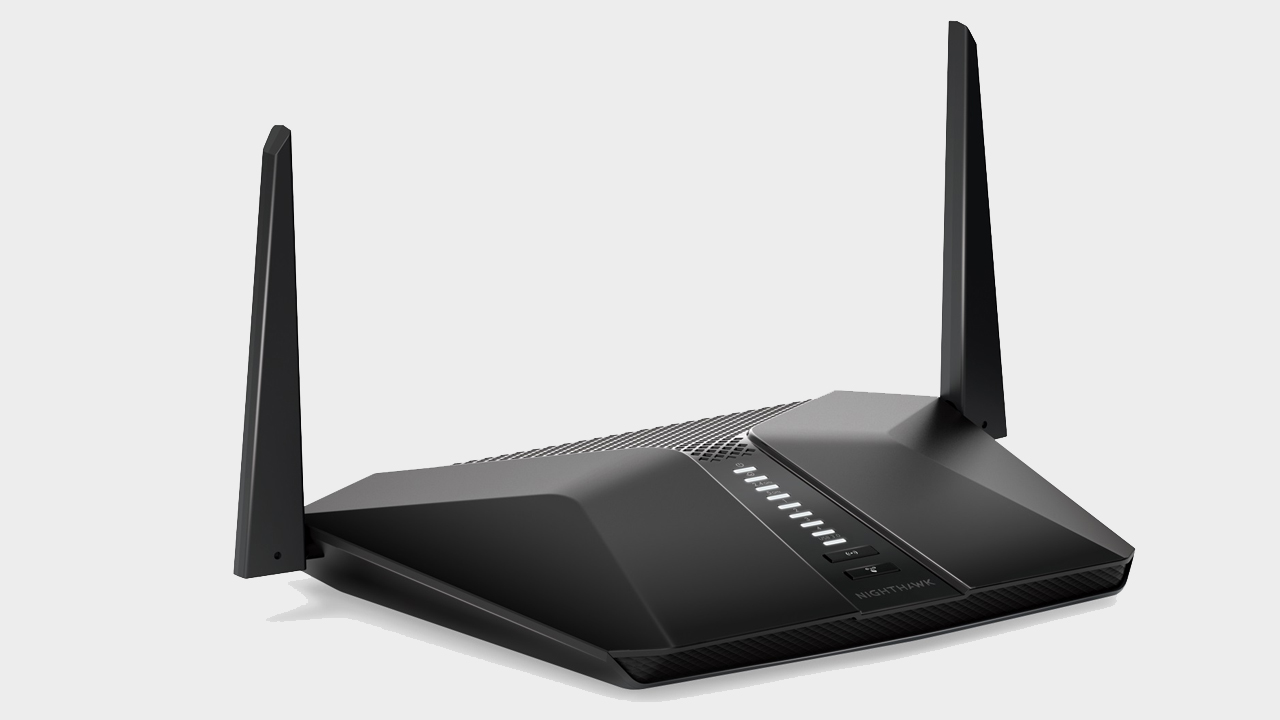
Wi-Fi 6 is spreading across product lineups, and the Nighthawk AX4 is an excellent example of what this spec can accomplish, even on a more budget router. The Nighthawk AX4 does not have flashy colored stripes and LEDs of high-end gear. Rather it has a horizontal orientation, with two external antennas, four Gigabit LAN ports, a single USB port, and a row of green indicator LEDs.
The Nighthawk app handles the interface, although it can also be used via a web portal, this is also more generic, as you won’t find the DumaOS here, but the more familiar Netgear one. There is also QoS (which is a simple toggle on or off) for gaming. Still, there is no granular control to better balance gaming needs and video streaming across multiple connected devices to optimize the experience better.
In testing, the AX4 achieved some great performance numbers when it came to throughput, with a close testing speed of 344 Mbps on the 2.4 GHz frequency and 345 Mbps on the 5 GHz frequency. It was also no slouch on the far testing with 222 Mbps on 2.4 GHz and 309 Mbps on the 5 GHz frequency showing the value of the Wi-Fi 6 spec. For those who want the throughput that Wi-Fi 6 offers at a more affordable price than most, the Netgear AX4 is an attractive offering.
Gaming router FAQ
Why would I particularly want a 'gaming' router?
The reason you go with a gaming router over a normal router is that they can prioritize traffic to your gaming PC and consoles—they're built to be greedy. The best gaming router reduces lag during your online game sessions, even if other devices in your household are streaming or downloading. If you've had the same router for years, it might be the right time to consider an upgrade if you want to get the most of your internet.
What's best for gaming, wired or wireless connections?
Given the potential for Wi-Fi connections to have hiccups, we would always suggest, where possible, to have your gaming PC wired into your router directly. Failing that, by a Powerline connection. Wireless connections are getting more effective, and Wi-Fi 6 is good enough that wireless VR streaming is actually now possible. And if latency creeps in there, that's when you throw up.
The best gaming routers have multiple LAN ports for wired connections—which are preferred—but most differ from ISP-provided gear through the use of the latest Wi-Fi standards, such as 802.11ax, aka Wi-Fi 6. This means faster and more efficient wireless data throughput for a greater number of devices. That last bit is key to rock-solid wireless performance in an age of smart devices and appliances.
Can I use any gaming router with my provider?
Before you splash out on a new router, you will need to make sure that it is compatible with your current ISP. Some ISP-provided cable modems, for example, don't offer pass-through connectivity to allow a high-performance router to be paired with it. So it's important to make sure you're not wasting your money.
from PCGamer latest https://ift.tt/3g5FYzH
The best gaming routers don't just offer speed; they also have no trouble meeting the reliability demands of competitive gamers on their home networks. Most also come with looks so edgy they'd look at home on the crest of a Gundam or scuttling around the deck of the Bebop. With Wi-Fi 6 support growing and promising greater bandwidth to a greater number of devices, now is the perfect time to upgrade your old router with something a little smarter.
Setting up the perfect home network for gaming is crucial for making sure all that money you're paying for superfast broadband is being used for the things that matter. And by things that matter, I mean playing Apex Legends, Valorant and Destiny 2, lag-free. Even the best gaming laptops or gaming PCs need a little help to get the best performance if you're looking for faster downloads or the smoothest experience for online gaming.
While gaming is best on a wired connection, high-speed Wi-Fi is now certainly a thing and getting better. But it can be tough getting wireless internet coverage all around your home, so it could be worth checking out the best Wi-Fi range extenders if you need a boost.
Best gaming router 2021

The Asus RT-AX88U is the best choice for a high-end router. It features next generation Wi-Fi 6 (802.11ax) technology, and an impressive eight Gigabit Ethernet ports, which even support link aggregation. Backing this up is the usual excellent AsusWRT interface, which allows granular control of every imaginable setting. There is also class leading Adaptive QoS, along with Trend Micro antivirus and the WTFast GPN—all with subscriptions included for the lifetime of the router—which are standouts among competing routers.
While the 2.4 GHz speeds are adequate, the 5 GHz speeds are where the RT-AX88U shines. Furthermore, for gaming in a congested environment, this router outdistances the competition. Sure, next generation 'super router' performance comes at a price of $346, but given these benchmarks, at least it's justifiable.

The Netgear Nighthawk Pro Gaming XR700 is a strong follow up to the XR500, which impressed us last year as it was the fastest router we had tested to date. Both are part of the company's 'Nighthawk Pro Gaming' networking line of products—but the XR700 is even faster than its predecessor.
The XR700 has plenty of the right ingredients, with one WAN and six LAN ports for enough wired connections, support for link aggregation, and even a 10 Gigabit LAN SFP+ port for ridiculous Ethernet bandwidth. Let's just get it out of the way—with all the attention on the wireless market heading to 802.11ax/Wi-Fi 6, this XR700 uses a combination of last generation 802.11ac/Wi-Fi 5 wireless, and 802.11ad technology (that's the 60 GHz frequency one), which unfortunately has not gone mainstream. It also supports Beamforming via four active antennas.
Another highlight of the XR700 is the gaming-centric Duma OS, which boasts Geo-Filter tech to connect to the closest server when gaming. The XR700 has granular control of the bandwidth, and can prioritize throughput by each individual device, for both the upload and download separately, and can assign a specific percentage for each device to balance the load—thereby preventing any single device from becoming a bandwidth hog.
In our tests the XR700 is a strong all around performer, starting with the 2.4 GHz frequency with some of the fastest scores to date of 284 Mbps at close range, and 225 Mbps on our far test. This continued on our 5 GHz testing with strong scores of 325 Mbps and 332 Mbps at close and far ranges, respectively.

The Asus ROG Rapture GT-AX11000 is designed to be the class-leading, 'best of the best gaming router, and looking at the hardware specs, it delivers—big time. Building on the prior routers of this series, the Asus ROG Rapture GT-AC5300, and adding in Wi-Fi 6 technology, it promises a lot. This router uses a dedicated 2.5G Base-T port for higher wired bandwidth and four Gigabit LAN ports, although we prefer the eight ports that other Asus routers offer.
On the wireless side of things, this is a Wi-Fi 6 tri-band solution offering more than 10 Gigabits of wireless bandwidth, along with DFS bands to avoid interference. Additional gaming-centric features include integrated WTFast, VPN Fusion to segregate gaming traffic from VPN for maximum throughput, Dynamic QoS to prioritize gaming traffic, Games Radar (no, not that one) to check the ping times to different game servers to minimize latency, and for those that prefer a more colorful surrounding, Aura RGB.
Running the Asus ROG Rapture GT-AX11000 through our testing left us seriously impressed. While the 2.4 GHz speeds are decent 171 Mbps on the far test, the 5 GHz speeds are exceptional, with the fastest throughput speed of any router so far at 334 Mbps. Oh, and we don't even have an 802.11ax USB Wi-Fi adapter yet, so this is using 802.11ac gear on the client-side. Yes, this router is really that good.
Best gaming laptop | Best capture card | Best gaming monitor | Best gaming headset | Best computer speakers | Best SSD for gaming

TP-Link's latest high-end gaming router is a significant improvement over previous models and now ranks among the best gaming routers around—especially when it comes to the 5GHz range, at which it excels. Our review of the TP-Link Archer C5400X saw us awarding it near-top marks. We love how easy the C5400X is to set up and use while still offering strong features: the ability to manage QoS easily, the inclusion of network security (via Trend Micro), and options to not only blacklist but also allow certain devices.
In terms of the throughput speeds, our tests clocked the following for the Archer C5400X: at 2.4GHz, it delivers 117 Mbps near / 112 Mbps far, which is somewhat middling, while at 5GHz, it performs extremely well, clocking 344 Mbps near and 347 Mbps far. From this perspective, it's market-leading.
What disappoints, if anything, is the lack of specific tech to decrease latency, which you see in competing models of the same price, like the Netgear XR500. In terms of ports and antennae, it's near-identical to the superb Asus ROG Rapture GT-AC5300 but doesn't quite offer the same performance. It is, however, a cheaper alternative and a highly recommended gaming router that's pleasingly easy to set up and manage.

Wi-Fi 6 is spreading across product lineups, and the Nighthawk AX4 is an excellent example of what this spec can accomplish, even on a more budget router. The Nighthawk AX4 does not have flashy colored stripes and LEDs of high-end gear. Rather it has a horizontal orientation, with two external antennas, four Gigabit LAN ports, a single USB port, and a row of green indicator LEDs.
The Nighthawk app handles the interface, although it can also be used via a web portal, this is also more generic, as you won’t find the DumaOS here, but the more familiar Netgear one. There is also QoS (which is a simple toggle on or off) for gaming. Still, there is no granular control to better balance gaming needs and video streaming across multiple connected devices to optimize the experience better.
In testing, the AX4 achieved some great performance numbers when it came to throughput, with a close testing speed of 344 Mbps on the 2.4 GHz frequency and 345 Mbps on the 5 GHz frequency. It was also no slouch on the far testing with 222 Mbps on 2.4 GHz and 309 Mbps on the 5 GHz frequency showing the value of the Wi-Fi 6 spec. For those who want the throughput that Wi-Fi 6 offers at a more affordable price than most, the Netgear AX4 is an attractive offering.
Gaming router FAQ
Why would I particularly want a 'gaming' router?
The reason you go with a gaming router over a normal router is that they can prioritize traffic to your gaming PC and consoles—they're built to be greedy. The best gaming router reduces lag during your online game sessions, even if other devices in your household are streaming or downloading. If you've had the same router for years, it might be the right time to consider an upgrade if you want to get the most of your internet.
What's best for gaming, wired or wireless connections?
Given the potential for Wi-Fi connections to have hiccups, we would always suggest, where possible, to have your gaming PC wired into your router directly. Failing that, by a Powerline connection. Wireless connections are getting more effective, and Wi-Fi 6 is good enough that wireless VR streaming is actually now possible. And if latency creeps in there, that's when you throw up.
The best gaming routers have multiple LAN ports for wired connections—which are preferred—but most differ from ISP-provided gear through the use of the latest Wi-Fi standards, such as 802.11ax, aka Wi-Fi 6. This means faster and more efficient wireless data throughput for a greater number of devices. That last bit is key to rock-solid wireless performance in an age of smart devices and appliances.
Can I use any gaming router with my provider?
Before you splash out on a new router, you will need to make sure that it is compatible with your current ISP. Some ISP-provided cable modems, for example, don't offer pass-through connectivity to allow a high-performance router to be paired with it. So it's important to make sure you're not wasting your money.
via IFTTT

Post a Comment